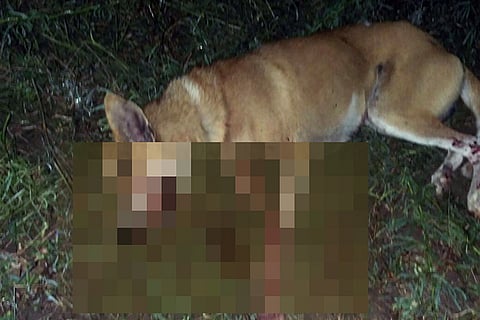

With parts of its brain spilling out of its mouth, a brown dog lies unmoving on the floor. Near it, is the body of another dog twitching in pain, with its mouth severly injured. It shudders in pain for another five minutes before succumbing to its injuries. This horrific tale of death from Trichy, was a result of country bombs meant to snare jackals near the National Institute of Technology.
Set by members of a local tribal community, it has resulted in furore over the cruelty it has resulted in. The police are now in the process of filing an FIR against the members of the community, after an animal activist filed a complaint.
The dying dogs were discovered on Thursday night by Arjun, an animal activist and final year student of engineering at NIT. A tea shop owner who lost his dog in the incident informed Arjun at 6.30pm last evening, following which he rushed to the spot.
"When I saw the second struggling I tried to call the police but it passed away in five minutes," says Arjun to TNM, as he waits at the local police station. "The accused had wrapped bombs they had made in the intestine of goats and left it on rocks. The dogs were lured by the meat and when they took a bite of it, it exploded," he explains.
But why were these bombs set up?
"The members of this tribe hunt jackals. They sell their teeth and leg bones as good luck charms. They are esentially poachers," says Arjun. "When we identified the culprit, he told me that the death of the dogs was a mistake and they only aim to kill jackals," he adds.
The jackal is protected under Schedule II of the Wildlife Protection Act, 1972.
But getting the police to file a case turned out to be harder than expected for the young activist.
"Initially they told me not to file a complaint because it will become a caste issue," says Arjun. "They even asked the tea shop seller which caste he belonged to. I had to call senior officials to actually ensure they took my complaint," he adds.
According to the activist, this was the first case reported against the poaching. "We don't know how many animals have been already killed because of this practice," he says.